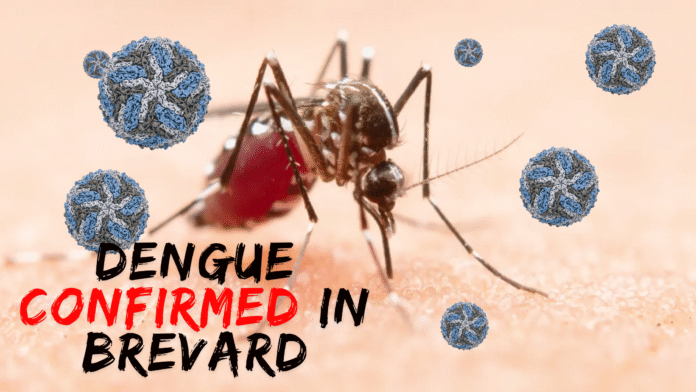Viera, Florida – The Florida Department of Health in Brevard County (DOH-Brevard) has issued a mosquito-borne illness advisory after confirming a human case of locally acquired dengue fever, prompting enhanced surveillance and prevention measures across the region.
The advisory, which went into effect earlier this month and is set to expire on September 12, 2025, alerts residents to the presence of the virus transmitted by mosquitoes. DOH-Brevard is coordinating with Brevard County Mosquito Control to conduct surveillance and prevention efforts, including ground-based and aerial spraying to reduce mosquito populations.
This marks at least the third locally acquired dengue case reported in Brevard County this year, contributing to a growing concern over mosquito-borne diseases along Florida’s southeast coast. Nearby, Miami-Dade County has also reported two local cases in 2025, highlighting the need for heightened vigilance during the rainy summer season. Statewide, Florida saw 91 locally acquired dengue cases across 10 counties in 2024, with Miami-Dade leading the tally.
Dengue fever, often nicknamed “breakbone fever” due to the severe muscle and joint pain it can cause, is a viral illness spread by the bite of infected Aedes mosquitoes, which are common in tropical and subtropical areas like Florida. Symptoms typically appear 3-14 days after a bite and include sudden high fever, severe headaches, eye pain, fatigue, nausea, and in some cases, rash or mild bleeding. While most cases are mild and resolve within a week, severe forms like dengue hemorrhagic fever can be life-threatening if not treated promptly.
The virus, caused by one of four related dengue serotypes (DEN-1 through DEN-4), was eliminated from the continental U.S. decades ago but has re-emerged sporadically. Florida has seen periodic outbreaks, including a notable one in Key West in 2009-2010 with over 80 cases, and smaller clusters in Martin County in 2013 and Key Largo in 2020. Factors like international travel, climate change, and urban development have contributed to the resurgence, as infected travelers can introduce the virus to local mosquito populations.

Nationally, the Centers for Disease Control and Prevention (CDC) reports that dengue remains a growing threat, with over 760,000 cases in the Americas as of early March 2025—a 15% increase from the previous five-year average. In the U.S., preliminary data for 2025 show ongoing transmission in territories like Puerto Rico, where a public health emergency was extended into December due to thousands of cases and multiple deaths in 2024. Locally acquired cases have also been detected in states including Florida, Texas, Hawaii, Arizona, and California.
Health officials emphasize that prevention is key, as there is no specific treatment for dengue beyond supportive care like rest, fluids, and pain relief. DOH-Brevard urges residents to take basic precautions to avoid mosquito bites, such as:
- Using insect repellent: Apply EPA-registered repellents containing DEET, picaridin, or oil of lemon eucalyptus, especially during dawn and dusk when mosquitoes are most active.
- Wearing protective clothing: Opt for long sleeves, pants, and socks when outdoors.
- Eliminating standing water: Empty containers like flower pots, buckets, and birdbaths weekly to prevent mosquito breeding.
- Screening homes: Ensure windows and doors have intact screens, and use air conditioning to keep mosquitoes out.
- Reporting issues: Contact local mosquito control for concerns about high mosquito activity.
The department also continues statewide surveillance for other mosquito-borne illnesses, including West Nile virus, Eastern equine encephalitis, and chikungunya. Residents are encouraged to report dead birds, which can indicate virus presence, to the Florida Fish and Wildlife Conservation Commission.
For more information or to report symptoms, contact DOH-Brevard or visit FloridaHealth.gov. Travelers to dengue-endemic areas should consult CDC guidelines before trips to minimize risks. As Florida’s wet season persists, officials stress community cooperation to curb potential outbreaks and protect public health.











